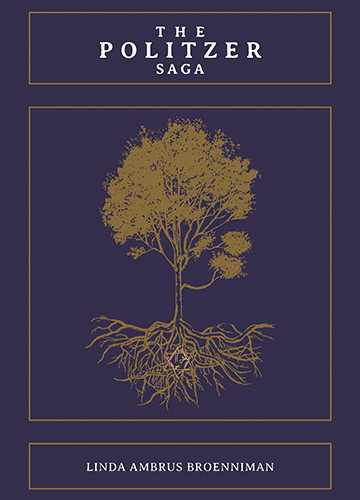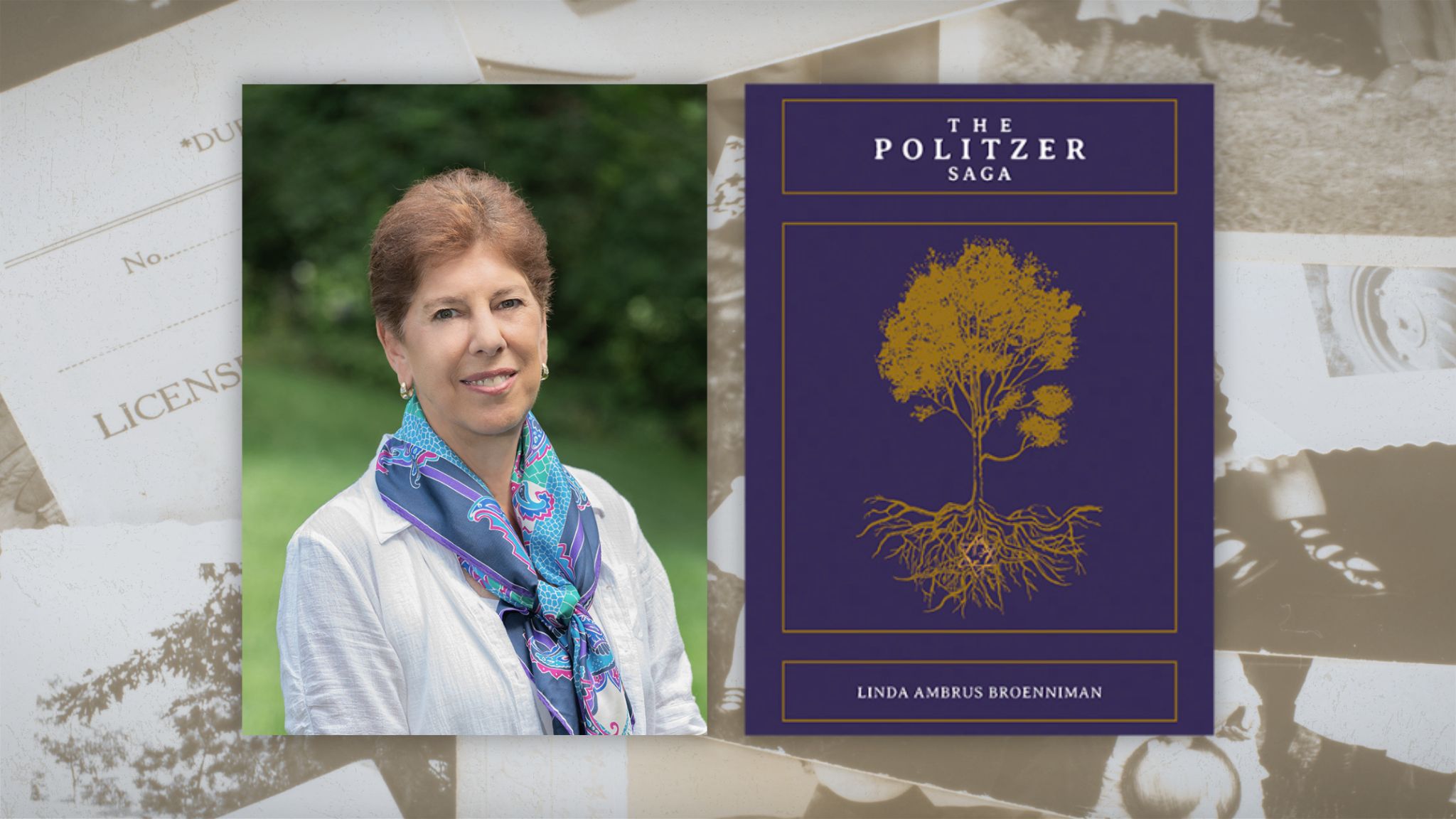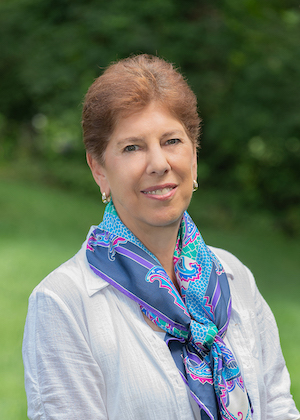The Politzer Saga by Linda Ambrus Broenniman
“When I was 27, I accidentally discovered that my father was Jewish. And that much of what I knew about him and his family was a lie.”
Most people, when sifting through old family photos and letters, aren’t expecting to unearth a family secret. But that’s the exact experience of Linda Ambrus Broenniman, author of The Politzer Saga (Bethesda Communications Group). Her findings led to the proof she’d been hunting down for years, ever since she accidentally learned the truth about her family’s origins.
In this interview, Broenniman reveals the process of discovering this long-hidden information and what it means to her to have a new understanding of family, identity and legacy.
Q: What was the driving force that led you to search out and discover generations of your family?
A: I grew up thinking I knew where I came from — I was the American born daughter of Catholic Hungarian parents. Almost 40 years ago, I discovered that much of what I knew about my family was a lie. Actually it was my older sister who accidentally learned from her godmother that our great-grandmother, Margit, was Jewish.
Although the secret was out, the truth was nowhere to be found — protected by an impenetrable web of secrecy. No one would answer questions about my family. At age 27, I didn’t have the courage to penetrate that web.
In the silence, a gnawing need for truth grew. Years later, a fire almost destroyed my parents’ house. And miraculously, a box was saved. In it, I found documents, letters and photographs. And with these I found the courage I needed.
Q: How did you even get started?
A: When I examined the box’s contents — tattered documents, nearly illegible letters, faded photographs — I realized that they had survived WWI, WWII, the Hungarian Revolution of 1956 and my parents’ house fire. The documents and letters were mostly in Hungarian. I quickly realized that Microsoft and Google translator were inadequate. Through a friend of a friend I found Anna, a Hungarian expat, who then introduced me to András Gyekiczki.
I can’t confirm divine intervention, but I know for sure that what I found would not have been possible without András, a Hungarian lawyer, sociologist and family researcher. András was a brilliant sleuth with the intellect and creativity to make obscure connections that would lead us to more discoveries. He found treasure in unexpected places.
Q: Was there any discovery you made about your ancestors that you would regard as startling?
A: Learning about my parents and grandmother were most startling. I thought I knew them, but I was shocked at how little I knew. They had lived lives I could not have imagined. Loving them did not mean really knowing them.
I was shocked to learn that my father served in a labor camp in the Carpathian mountains, forced to do hard labor. The camp was bombed and my father escaped with five men. How they survived and made it back to Budapest is a mystery.
They returned to my mother, his fiancée at the time, who had moved into an abandoned factory to hide Jews, for which she was honored by Yad Vashem as a Righteous Gentile. When she received this honor, I hadn’t yet discovered that my father and grandmother were among those she saved.
Q: What was the greatest joy you took from this endeavor?
A: To find the truth has been uplifting and brought a certain peace. The weight of not knowing has lifted. To understand where I came from, multiple generations before my parents, has enabled me to let go of fear and doubt that have been lifelong companions and replace them with strength and a new confidence. I feel blessed to have this extraordinary Jewish history and legacy. I feel blessed knowing that I have deep roots. It gives me a sense of belonging.
One of my unexpected joys from this journey was meeting new relatives, in the US and in Hungary. Our first encounters were filled with amazement at uncanny similarities … in physical appearance, in gestures and facial expressions and in thinking. The Politzer genes run deep. Another validation that we belonged.
Q: You have a knack for making these real people seem like characters in a fiction book. Tell us about your writing style, and how you made it all come together.
A: As a first-time author, I never thought about my writing style. I wrote what came naturally to me.
To know my ancestors, to connect with them, I needed to understand the zeitgeist of the times. I wanted to understand why … why these things happened? What was the psyche that enabled Hungarians to survive severe traumas at the hands of oppressors and turn around and act as vicious perpetrators? So I started to read — history books, articles delving into various theories, biographies, personal accounts, non-fiction and fiction — anything that could provide understanding.
And then I puzzled together the stories based on all the information I had gleaned, trying to come close to the truth.
Q: What do you hope readers take away from this book?
A: Finding my family brought me face-to-face with a dark history I had only read about, removed in time and place from the reality of my life — a history I thought was safely in the past. Yet antisemitic incidents in the U.S., according to Anti-Defamation League statistics, are at their highest level since 1979. To read these stories is to know that these incidents are not new. That especially now, we must be vigilant and ensure that hatred cannot be tolerated. That history cannot repeat itself.


 Linda Ambrus Broenniman grew up in Buffalo, New York. She is the middle child of seven born to Hungarian physicians who survived World War II and started their new life in the US in 1949. Linda graduated from Swarthmore College with a BA in psychology. Several years after getting her MBA from Carnegie Mellon, she left mainstream corporate America to follow her path as an entrepreneur, building companies in technology and biotech. She let her passion for uncovering hidden potential in unexpected places guide her. And she allowed this passion to fuel her search for her hidden family. Linda lives in Great Falls, Virginia with her husband of 28 years and their dog, Juno.
Linda Ambrus Broenniman grew up in Buffalo, New York. She is the middle child of seven born to Hungarian physicians who survived World War II and started their new life in the US in 1949. Linda graduated from Swarthmore College with a BA in psychology. Several years after getting her MBA from Carnegie Mellon, she left mainstream corporate America to follow her path as an entrepreneur, building companies in technology and biotech. She let her passion for uncovering hidden potential in unexpected places guide her. And she allowed this passion to fuel her search for her hidden family. Linda lives in Great Falls, Virginia with her husband of 28 years and their dog, Juno.


